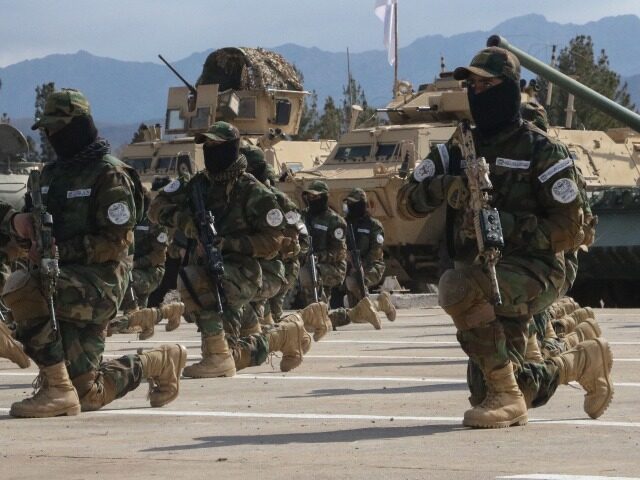According to U.N. investigators, at least three high-ranking officials in the Taliban regime have strong links to al-Qaeda, and about 400 al-Qaeda fighters are currently rebuilding the terrorist group’s “operation capability” in Afghanistan.
One of the Taliban’s provincial governors, Qari Baryal, is a “most wanted” al-Qaeda terrorist who was involved in bomb attacks against American forces.
The United Nations Security Council (UNSC) tasked an Analytical Support and Sanctions Monitoring Team with examining the Taliban’s links to al-Qaeda and other terrorist groups in 2022. The team presented its report in early June, concluding that a disturbing number of al-Qaeda members have enjoyed the “patronage of the Taliban” and secured “appointments and advisory roles in the Taliban security and administrative structures.”
Baryal, for example, has been on the U.S. most wanted terrorist list for over 15 years. He is well-known to the U.S. military as both a Taliban leader and an al-Qaeda operative who oversaw “IED production, suicide personnel allocation, and overall attack planning and execution” in the area around Kabul during the long American operation in Afghanistan.
The Taliban appointed Baryal as governor of Kabul province only two months after President Joe Biden’s disastrous withdrawal from Afghanistan in August 2021. He was later transferred to become governor of Kapisa province.
Another Taliban leader highlighted in the report is Hafiz Muhammad Agha Hakeem, who, like Baryal, became governor of one province after the Taliban takeover but was moved to another. He is now the governor of Panjshir.
According to the U.S. military, Hakeem’s terrorist resume includes leading the “Kabul Network,” a joint force of Taliban and al-Qaeda fighters that plotted suicide bombings of American and allied forces.
A third top Taliban official with al-Qaeda links is Tajmir Jawad, Deputy Director of Intelligence for the Taliban’s “Islamic Emirate of Afghanistan.” Jawad is a Muslim cleric and a former field commander for the Haqqani Network, the terrorist gang and crime ring that seamlessly integrated with the Taliban to rule Afghanistan after Biden’s catastrophic withdrawal.
“Until last month he was running a suicide bombers’ training camp,” former European Union and U.N. adviser for Afghanistan Michael Semple said of Jawad in September 2021. “The kind of people that Al-Qaeda treats as their peers or supporters are now moving straight out of the suicide-bomber training camps into running the intelligence service.”
Semple said the Haqqani Network’s long-standing ties to al-Qaeda gave the Taliban a bridge to the infamous global terrorist organization, an analysis echoed by the UNSC report, which said the Taliban also has a “symbiotic” relationship with Tehrik-e-Taliban Pakistan (TTP), which is reportedly using American equipment Biden abandoned in Afghanistan to attack the Pakistani government.
The report said:
There are indications that Al-Qaida is rebuilding operational capability, that TTP is launching attacks into Pakistan with support from the Taliban, that groups of foreign terrorist fighters are projecting threat across Afghanistan’s borders and that the operations of ISIL-K are becoming more sophisticated and lethal (if not more numerous).
It further warned:
Al-Qaeda still aims to strengthen its position in Afghanistan and has been interacting with the Taliban, supporting the regime, and protecting senior Taliban figures. Al-Qaeda maintains a low profile, focusing on using the country as an ideological and logistical hub to mobilize and recruit new fighters while covertly rebuilding its external operations capability.
ISIL-K is another name for the Islamic State – Khorasan Province, the branch of ISIS active in Afghanistan. The UNSC report warned ISIS is taking advantage of the Taliban’s weak grip on the Afghan hinterlands to recruit fresh fighters and may now have up to 6,000 members in camps spread across 13 provinces.
The Taliban rejected the U.N. report, insisting its regime has honored its “commitments” to keep terrorists at bay, so there is “no threat from the territory of Afghanistan to the region, neighbors and countries of the world.”
“There are no terrorist groups in Afghanistan. They cannot operate in the country, and we don’t let them operate in Afghanistan,” Taliban Foreign Minister Amir Khan Muttaqi stated in May.
Some international observers and U.S. officials were also skeptical of the U.N. report’s conclusions, suggesting the U.N. monitors overstated al-Qaeda’s strength in Afghanistan.
“These stats do not align with our intelligence community’s analysis in a number of areas,” one U.S. official told Voice of America News (VOA).
Another unnamed senior U.S. official said the report was “wildly out of whack with the best estimates of the U.S. intelligence community, and indeed the best estimates of our partners and allies.”
This second official said that while the UNSC report claimed 30 to 60 “core” members of al-Qaeda are currently enjoying the Taliban’s hospitality, the U.S. intelligence estimate is “fewer than a dozen,” and no senior member of the terrorist organization has sought safe haven in Afghanistan since a U.S. airstrike killed al-Qaeda leader Ayman al-Zawahiri last July.

COMMENTS
Please let us know if you're having issues with commenting.